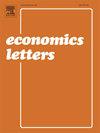外国-本土工资差距和任务:来自日本劳动力市场的证据
IF 1.8
4区 经济学
Q2 ECONOMICS
引用次数: 0
摘要
本文通过考察任务的作用,为日本劳动力市场的外籍工资差距提供了新的实证证据。通过利用政府微观层面的数据和日语版的O*NET,我们在详细的职业层面构建了任务得分(la Acemoglu和Autor, 2011)。然后,我们根据Mincer(1974)的精神估计了外国和本国的工资差距。无条件地,外国工人的收入比本国工人低27%;这种差距的82%可以用可观察到的特征来解释。在剩余的无法解释的差距中,大约有三分之一是由任务造成的,这表明外国工人被分配到工资较低的任务上,通常是体力劳动和日常工作。本文章由计算机程序翻译,如有差异,请以英文原文为准。
Foreign–native wage gap and tasks: Evidence from the Japanese labor market
This paper provides novel empirical evidence on the foreign–native wage gap in the Japanese labor market, examining the role of tasks. By leveraging government micro-level data and the Japanese version of O*NET, we construct task scores à la Acemoglu and Autor (2011) at a detailed occupational level. We then estimate the foreign–native wage gap in the spirit of Mincer (1974). Unconditionally, foreign workers earn 27% less than native workers; 82% of this gap is explained by observable characteristics. Tasks account for roughly one-third of the remaining unexplained gap, suggesting that foreign workers are assigned to lower-wage tasks, typically manual and routine tasks.
求助全文
通过发布文献求助,成功后即可免费获取论文全文。
去求助
来源期刊

Economics Letters
ECONOMICS-
CiteScore
3.20
自引率
5.00%
发文量
348
审稿时长
30 days
期刊介绍:
Many economists today are concerned by the proliferation of journals and the concomitant labyrinth of research to be conquered in order to reach the specific information they require. To combat this tendency, Economics Letters has been conceived and designed outside the realm of the traditional economics journal. As a Letters Journal, it consists of concise communications (letters) that provide a means of rapid and efficient dissemination of new results, models and methods in all fields of economic research.
 求助内容:
求助内容: 应助结果提醒方式:
应助结果提醒方式:


